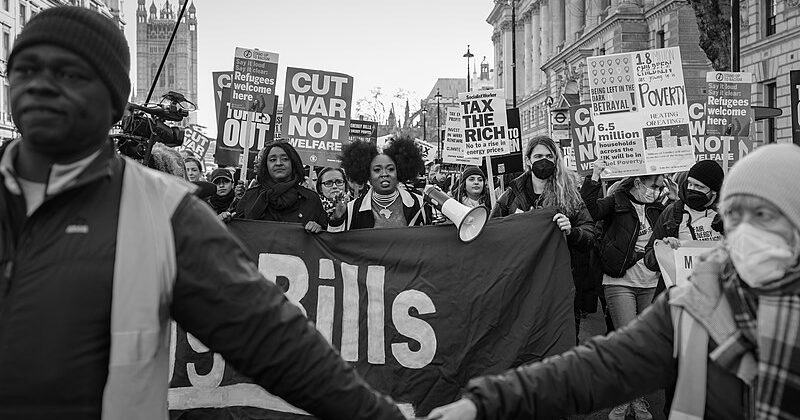

By Urte March
We face the worst cost of living crisis in living memory, with inflation at a ten-year high, compounded by soaring energy bills and National Insurance hikes, all on top of a decade of stagnant wages.
Many face the choice between heating and eating—the Resolution Foundation estimates that 1.3 million people will be pushed into ‘absolute poverty’ this year.
Though we have seen a spate of strikes against below-inflation pay offers, the discontent has not yet crystalised into a national strategy. The People’s Assembly, an umbrella coalition supported by the Trades Union Council (TUC) and the major trade unions, supported a grassroots-organised day of action in early March aimed at kick-starting a fightback. This brought decent numbers onto the streets around the country, but a follow-up demonstration in London was poorly attended.
Keir Starmer’s Labour Party is largely absent from the struggle. However, the TUC is organising a national demonstration in London on 18 June. While such ‘days of action’ can play an important role in emboldening or solidifying a mass movement capable of reaching low paid workers, something much more sustained and widespread is needed.
Several high profile strikes by both mainstream trade unions like the bus drivers organised by Unite, and the smaller, syndicalist unions including outsourced security guards at Great Ormond Street Hospital organised by UVW, have captured public attention in recent weeks. However, the failure of the RMT union to wage a militant struggle against the illegal sacking of 800 seafarers at P&O ferries will embolden other bosses and shows we need to organise networks of rank and file trade unionists to campaign for class struggle methods against the employers’ offensive.
But, however succesful, isolated strikes over economic demands are not enough to tackle the crisis. Many employers holding down wages are in the public sector, or have been in receipt of huge government bailouts over the last years. This inflationary crisis is not just caused by the Covid pandemic—it is the result of companies’ drive to shore up their bottom line in the face of falling profitability after a decade of economic stagnation. Unless workers organise in their workplaces and communities and participate in both trade union and political action, their living standards will be continually eroded.
Combining the struggle
Socialist organisations and community activists have an important role to play in linking industrial struggles with the wider labour and social movements, to make demands on the government that go beyond wage increases. This can be achieved through collaboration between the trade unions, activists and community organisations fighting on issues like housing, and women’s, Black and disabled people’s rights.
Together we can organise local action committees which can start organising around concrete disputes and local issues. In the first instance, we need to fight to defend public services like TfL, facing a £2billion shortfall in funding, which the government will try to recoup by cutting jobs and raising fares. At the same time as RMT members take industrial action over jobs, such action committees could act in solidarity to protect these essential public services.
Community activists could support industrial disputes through solidarity committees, encouraging and supporting workers offered below-inflation pay rises to take action. A key demand is for an escalator clause in employment contracts, with a sliding scale of wages, pensions, universal credit, child and housing benefits, linked to a workers’ cost of living index.
With energy costs making up a huge part of the cost-of-living squeeze, climate campaigns will be an essential element of the movement. The demand for better home insulation is vital when the vast proportion of workers’ energy bills go towards heating their homes. Local action committees could also campaign for a national ‘can’t pay, won’t pay’ campaign as energy bills soar, and council tenants could consider a rent strike to demand better insulation of homes.
Activists also need to be ambitious, and bring local movements together into a nationally coordinated United front, raising demands that can hold together the diverse groupings of the working class in a common struggle towards a single goal: raising income to a level that provides a decent life for all, paid for by the rich under threat of expropriation.
In the wake of the lifting of the energy price cap, a clear fight is needed to force the government to introduce a new cap, linked to an accurate cost of living index under workers’ supervision, alongside a 100% windfall tax on energy companies’ excess profits.